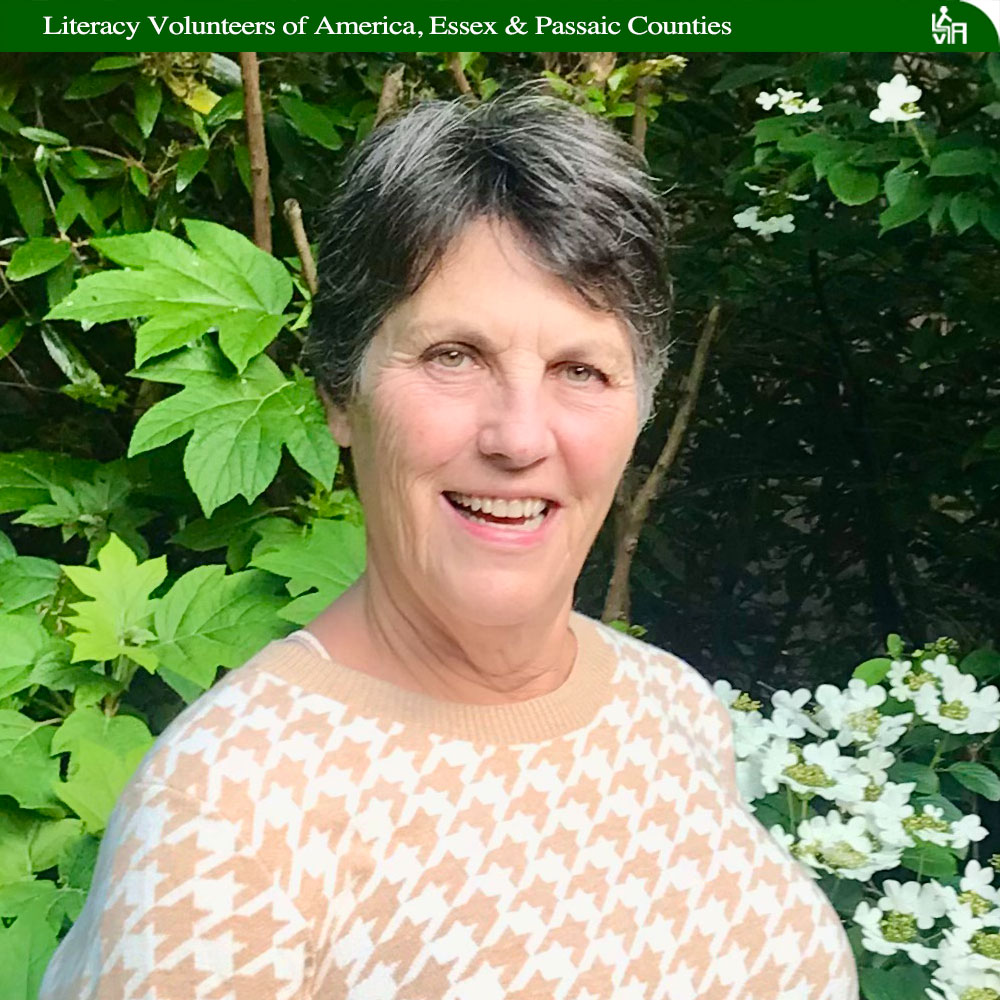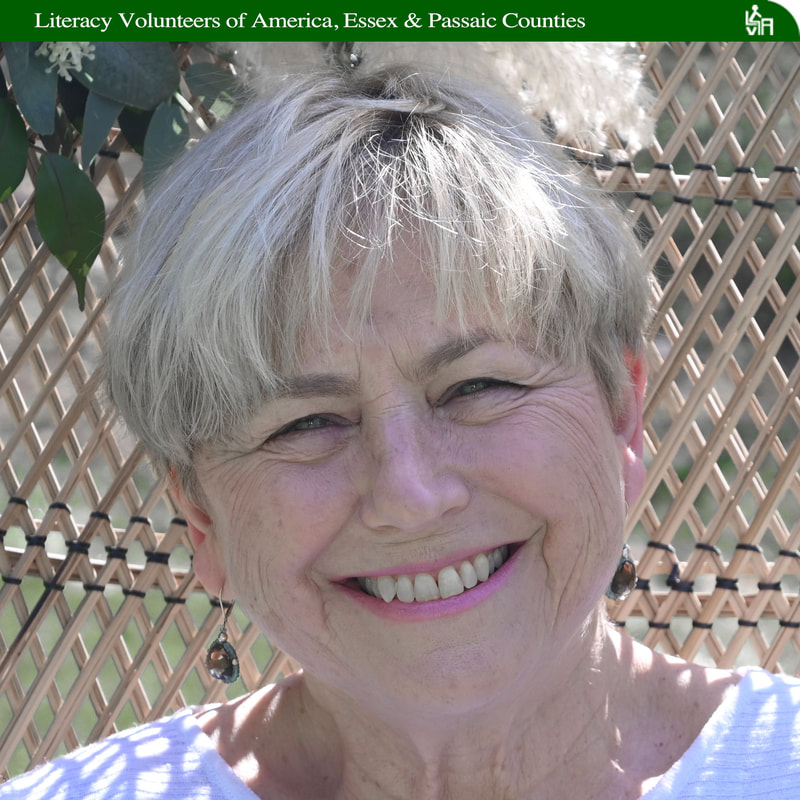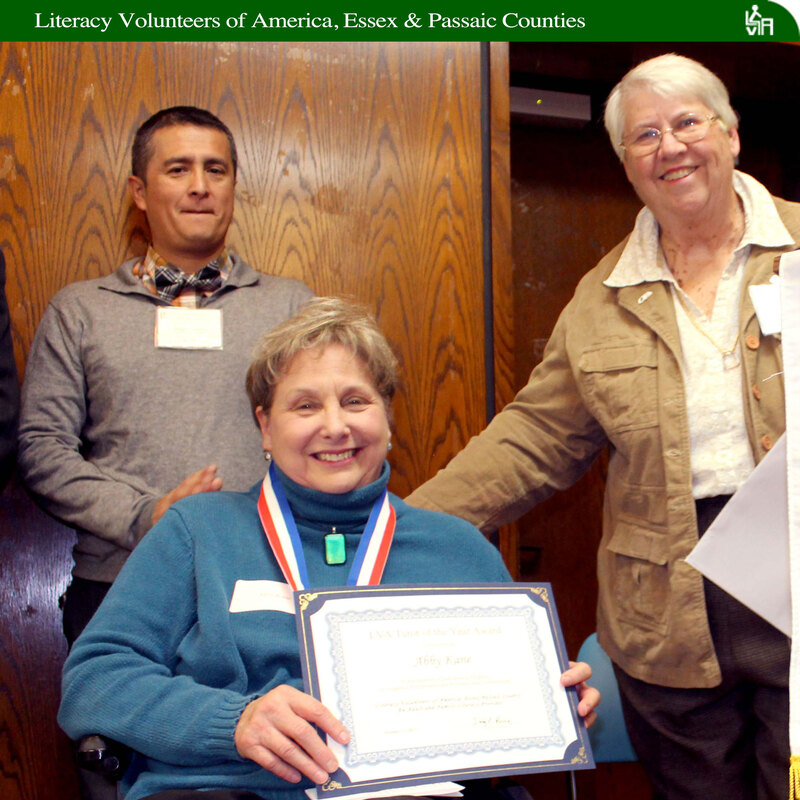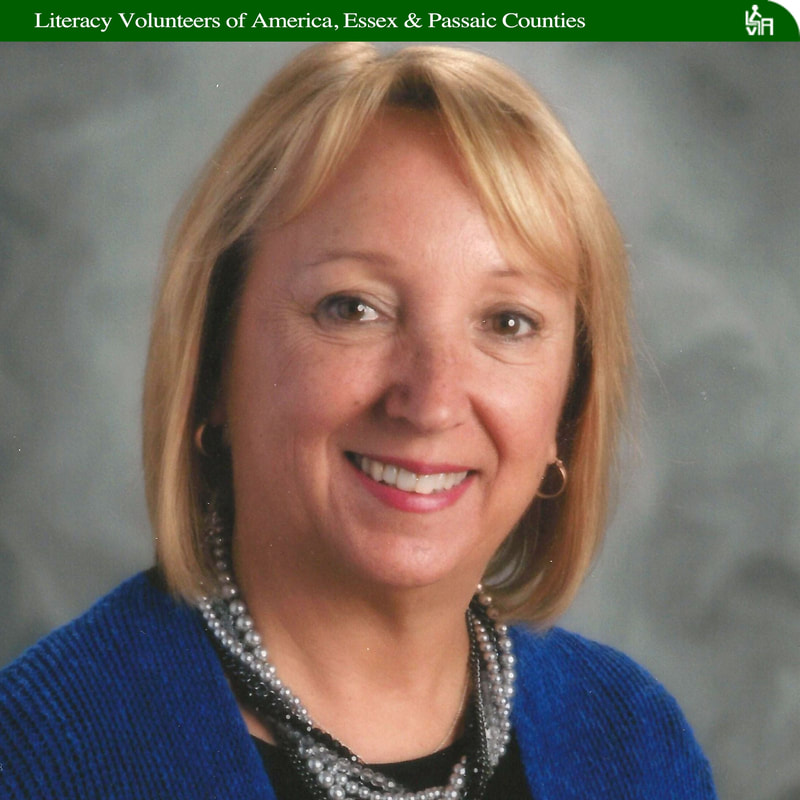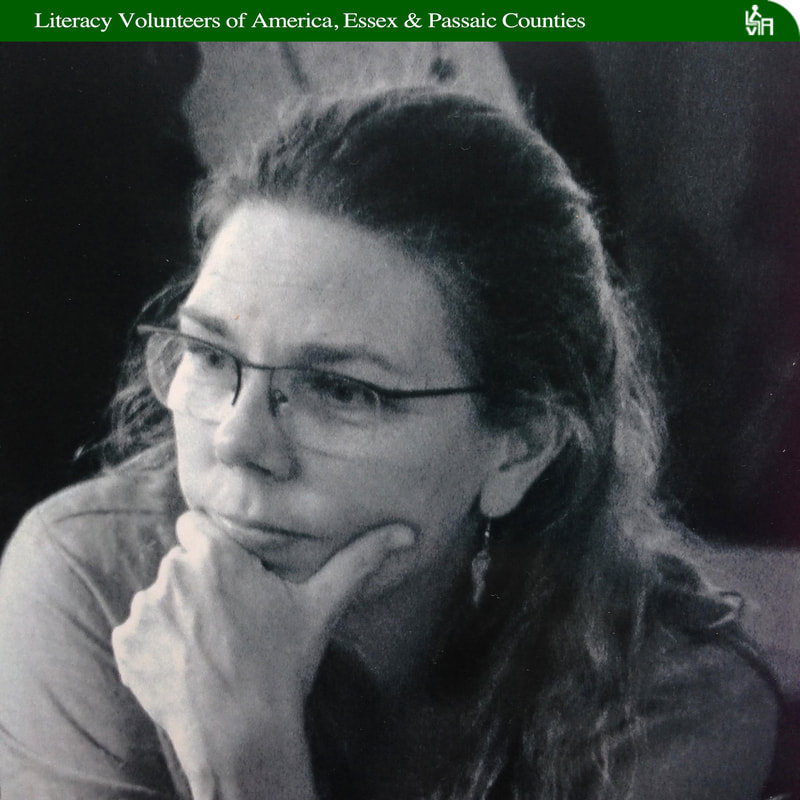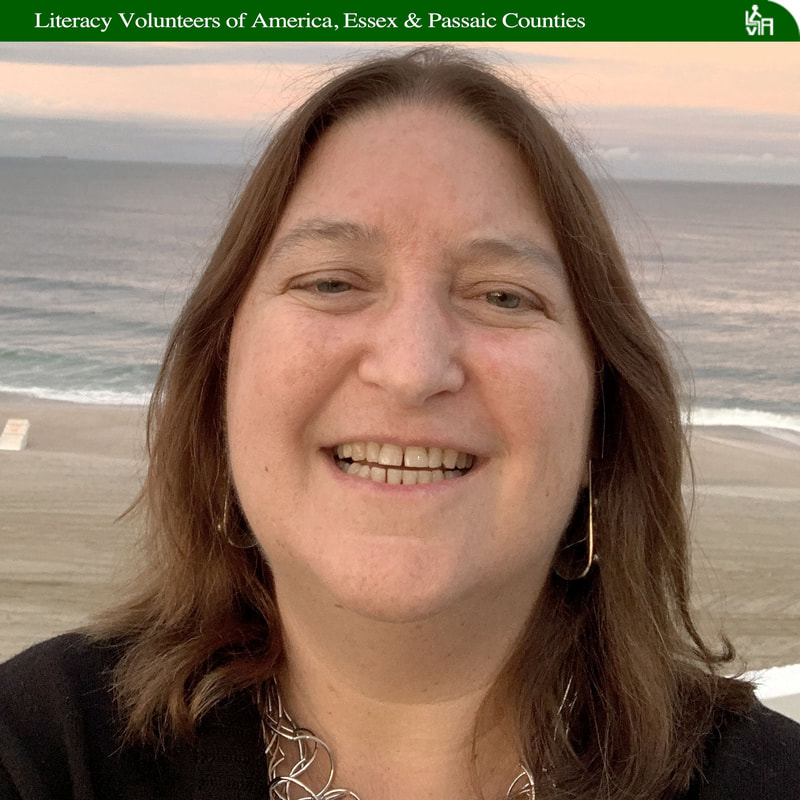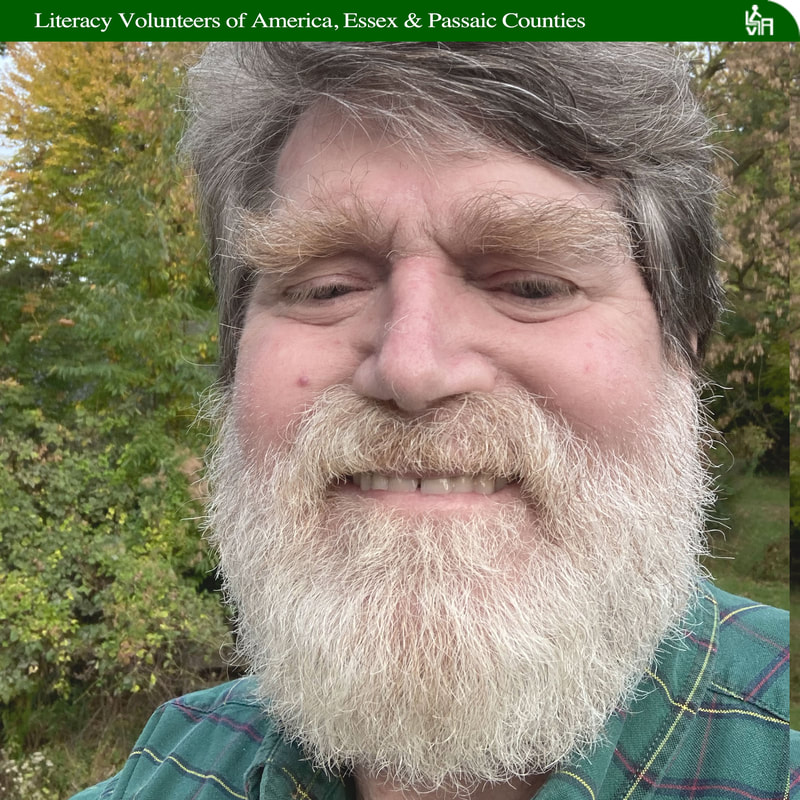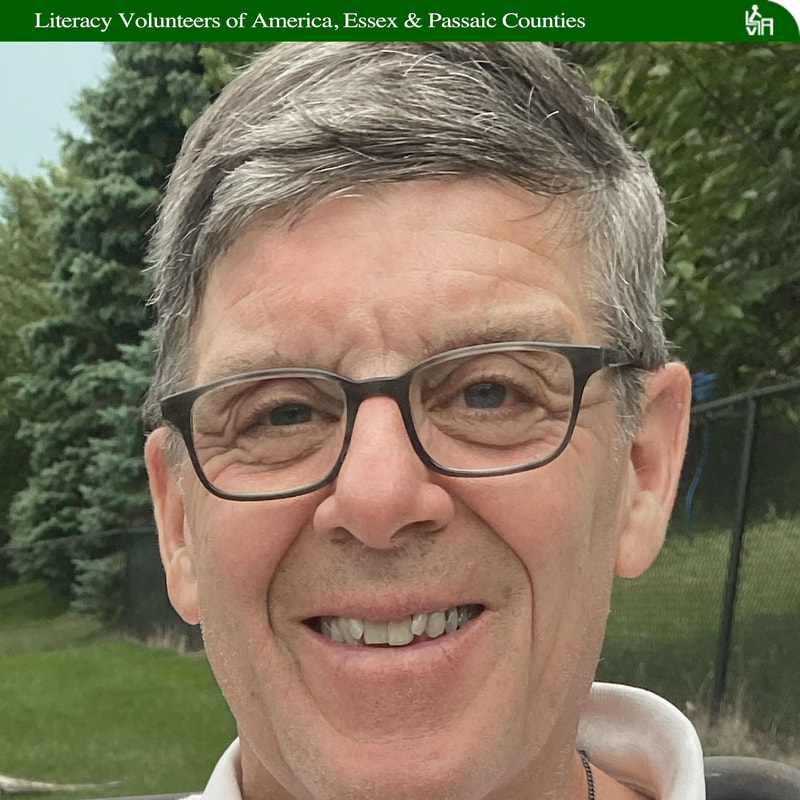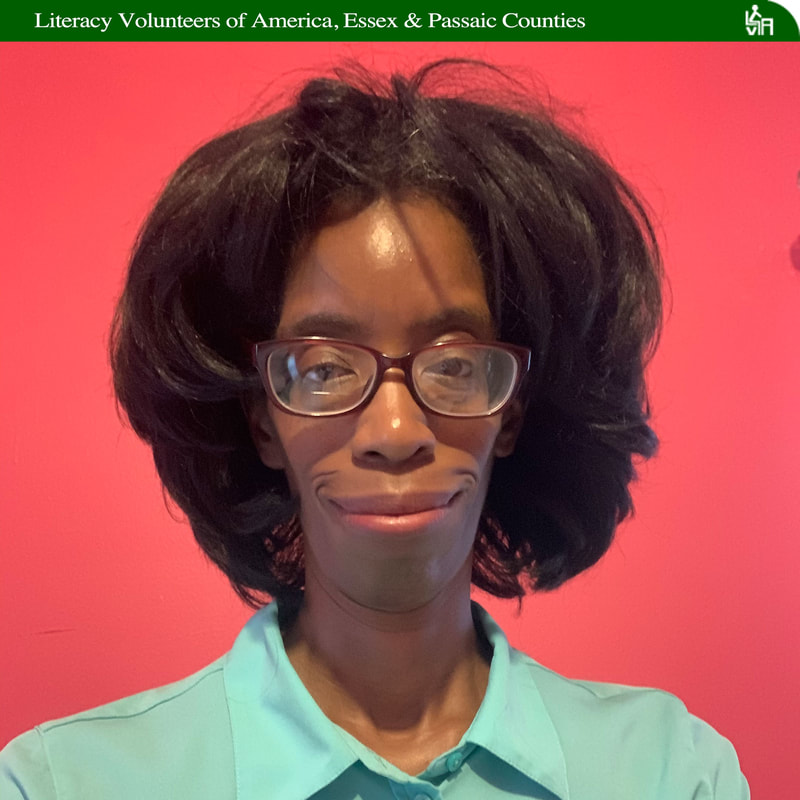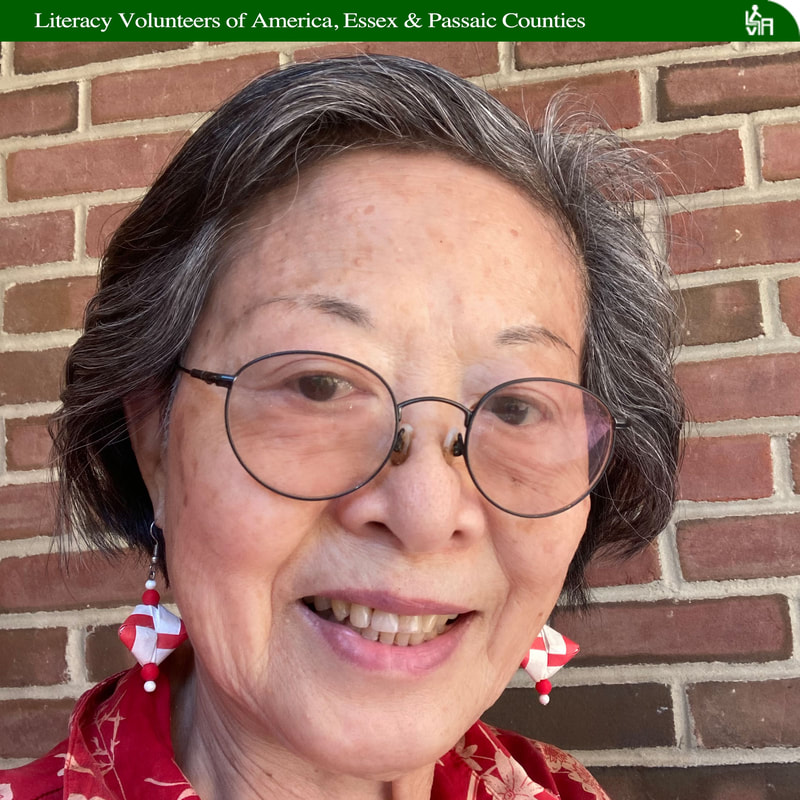Volunteers' Stories 2021-22
Everyone has a story, unusual, exciting, different. Many of them are just waiting to be read by others. From the front lines in Bosnia to the front office in Manhattan, Literacy Volunteers of America tutors come to us with fascinating backgrounds. We are proud to share the highlights of these amazing individuals who bring their varied experiences to our students.
Enjoy reading about people like the former missionary who provided medical supplies to remote villages, retired business people, lawyers, healthcare providers, college students, building for the future, who generously share their wealth of newly acquired knowledge, and even mothers whose role as primary as caregiver for their children willingly juggle home life, work as well as tutoring.
Enjoy reading about people like the former missionary who provided medical supplies to remote villages, retired business people, lawyers, healthcare providers, college students, building for the future, who generously share their wealth of newly acquired knowledge, and even mothers whose role as primary as caregiver for their children willingly juggle home life, work as well as tutoring.
Hedda MalehHedda Maleh and her students have grown close over the past year, while sharing personal stories both sad and joyous.
They’ve consoled a student whose mother is stuck in Taliban-controlled Afghanistan, unable to leave and fearful of having her daughter visit. And they’ve cheered on another, a Chinese native who recently became a U.S. citizen. They’re a tight-knit group, for one that chats only via computer. “I would love to meet them,” said Hedda, whose group also includes students from Colombia and Turkey. “They’ve become like family. For a year we’ve had a lot of trials and tribulations together.” Hedda is a Middletown, NY native and retired educator who taught 4th grade Elizabeth public school students for 25 years. She’s much more accustomed to face-to-face lessons and, while she bemoans online classes a bit, she’s practical about their convenience. “There’s no way we could ever meet in person,” said Hedda, explaining that some in her group live far from the library or babysit during the day. “They actually like being online. It’s easy for them.” And helpful, according to her students, who appreciate Hedda’s style of encouraging them to speak about themselves and their families as they help one another through exercises focused on news, conversation, and writing. “She never stops a student from speaking, she encourages us to talk about our lives,” said student Qingling, an internationally-known artist from Shanghai, China, who recently passed the U.S. citizenship test. “She is very compassionate and thinks about others. She is my window to understanding the American people.” |
Diane MasucciWe asked tutor Diane T. Masucci to give us some insight into her background and experiences as a tutor, to which she offered the following:
Born in Detroit, Mich., I am the second of five children who are grandchildren of European immigrants on my mother’s side. My grandfather struggled to learn English on his own, always carrying an English dictionary. My father was from Newark, N.J. so our family occasionally visited with trips to Ocean City, where we rode tandem bikes on the boardwalk and learned to catch waves on the Atlantic Ocean seashore. I am a graduate of Wayne State University in Detroit with dual degrees in Journalism and American Studies. I worked my way through college as an editorial researcher at the Detroit Free Press, a large newspaper which also paved my way into journalism. I was also a volunteer with a civil rights organization named Focus:HOPE in Detroit, which helped me understand the challenges our country faces with racial issues. From Detroit, I headed east and landed a job in Woodbridge, N.J. at The News Tribune as a journalist and then was hired at The Home News in New Brunswick, a regional newspaper covering central New Jersey. I have won prizes for deadline stories as well as features including one on teenage pregnancy; our team won a national prize from The American Academy of Pediatrics. I also covered environmental issues, including stories that led the federal government to clean up its first superfund hazardous waste site in Somerset County. I also wrote a biography of Beatrice A. Hicks, co-founder of Society for Women Engineers, for a reference book on New Jersey women in history called “Past and Promise: Lives of New Jersey Women” (1990). I hold an MFA in fiction from The New School, 2013. I have taught elementary students in the Montclair Writer’s Room. I write short fiction, poetry, essays and am working on a historical fiction novel. I have been teaching with the Literacy Volunteers for about three years and currently have two adult students, one from China and one from Haiti. We meet once a week and cover a variety of topics from The New York Times or from Readworks. I have found Word by Word Basic to be helpful to identify specific words students need to know for their daily lives. I also use All Things Grammar and Topics and breaking news sites. I have used the Gutenberg online free books site to read some classical literature. It is not easy to find interesting books that meet both my students’ skill level and interests as adults. I decided to try tutoring because I want to help immigrants communicate so they can work, go to school, take care of their families and learn about American values and culture. I especially love to learn about their families and their cultures. We have lively discussions about everything from Johnny Depp to various kinds of foods. They help me understand what it’s like to grow up in a different culture. I think the most satisfying moments are when I’m silent and listen to the two of them helping each other to solve problems. Learning English has enabled them to help each other! |
Abby KaneAbby Kane’s conversation groups are known as a safe space for students. Even when the world outside isn’t.
When a Colombian student described the degrading treatment she suffered on her job, the group openly discussed racism. There was also an important conversation about the September 11th attacks, which took a surprising turn while discussing the terrorists. “A student from Nigeria stopped us and said ‘I just want to make sure you understand that this is not what it’s about to be a Muslim’,” recalled Abby, an LVA tutor of the year who has helped students from 23 countries improve their English over the last decade. “And what she said was profound, and the fact that she cared so much about it that she stopped the group and said, ‘No, I have to make sure you understand’,” Abby added. “I had already started crying, while remembering what it was like that day. It was quite a class.” No matter how sensitive, all topics are welcomed by this Queens native, who enrolled as a literacy volunteer after her retirement as the Director of Psychological Counseling at Bloomfield College or, as she puts it, “the school shrink”. But there is one rule: Don’t pretend you understand something if you don’t. She’ll spot you in a NY minute. “Say I don’t know what you’re talking about, or I don’t know what that means,” Abby explained. “Then it becomes easier for everyone to do it.” Her groups tend to be large and at times have neared a dozen adults. Besides the news, they drill on grammar topics, like prepositions, and discuss their diverse cultures. “You can absolutely talk about anything and she’s very open about everything,” said Barbara, a journalist from France and one of Abby’s current students. “She’s very kind and she’s very passionate. She’s perfect in fact.” Maritza, a former student from Peru, said Abby makes students “feel valued” as they navigate the difficulties of a new language and culture. “Her enthusiasm made us participate and in that way we were part of the class,” Maritza said. Abby’s current group of six students include two adults from the Dominican Republic, and one each from Ecuador, France, Jamaica, and Nigeria. She’s only met one of them in person, given pandemic restrictions that forced classes to go virtual. “By the time they get to my class they mostly need confidence, but they know a lot,” she said. “I tell them all the time; how much more impressive they are than I am” when it comes to foreign languages. Abby earned both a bachelor’s in English and a master’s in college counseling and student development at Hunter College, and a doctorate in psychology from Columbia University. She is a widow, has two adult sons, and is about to become a grandmother. Prior to the pandemic, she made regular visits to immigrants detained in Hudson and Bergen County jails, as a volunteer visitor for First Friends of NJ & NY, an advocate group for immigrant detainees and asylum seekers. As a literacy tutor, she said “I think I get so much more than I give and I’m not just saying that. I find LVA students to be the most interesting group of people. I feel that every week I get to learn about another place – their homes, their cultures, what makes them angry, the things they miss. I have the best time, I must say.” |
Kim FioreKim Fiore has formed an impressive bond with the three women who make up her student group even though, in person, they’ve never met.
That’s not unusual for educators and students today, folks who were assigned to one another during the height of the pandemic and had to make due with online video platform sessions when in-person meetings were discouraged. And, while other options may soon become available, virtual meetings are likely here to stay, at least for her group, Kim acknowledged. “Once people get used to doing things online, it makes it a lot easier logistically,” said Kim, a literacy tutor for one year. “One of my students, I don’t know if she would be able to come if it’s in person.” Her students, who hail from Latin America and China, spend their time each week discussing the news and language structure, using websites like “All Things Grammar” and “News in Levels”, among others. Kim’s sessions stress current events and she encourages the women to use the news as a starting point for broader conversations. It helps promote critical thinking, enhances reading and comprehension skills, and just plain gets them talking. “I want them to have the confidence to go out and speak to people, to ask questions, to be able to ask for help,” Kim said. “And I tell them all the time, they’re a lot better at learning English than I am at their languages.” Kim earned a bachelor’s degree from Rutgers University, where she majored in math and computer science, and a master’s degree in instructional media from Wilkes University in Pennsylvania. She worked in a corporate IT division and later taught technology at a K-8 private school for a couple of decades. She retired from teaching just before the start of the pandemic and was looking for an opportunity to volunteer. She’d helped out before at a food pantry and considered doing the same when a tutor friend recommended that she try LVA. She attended a training workshop taught by Catherine Mitch in 2020 and hasn’t regretted the decision to tutor. “It’s worked out pretty well,” she said. “I like the group that I have. I have three women from different backgrounds and we enjoy our time together. I enjoy getting them more confident about speaking.” Kim loves spending time with her grandchildren, a boy and girl who live nearby. Prior to the pandemic, she enjoyed traveling, both internationally and around the country. She often accompanied her husband on his “golf vacations” and usually managed to join a pickle ball game or two while on the trips. |
Elizabeth JacobsElizabeth Jacobs recalls the story of an immigrant woman she’d met, an undocumented worker who was in an abusive domestic relationship. The woman, who worked in the bathroom of a city restaurant, first caught the attention of Elizabeth’s daughter, a restaurant worker who befriended her.
Together mother and daughter sought resources to assist the woman, who understood some English but wasn’t comfortable speaking it or seeking help. “I realized it really could change this woman’s life if she could speak better English,” Elizabeth explained. Sometime later she spotted a recruitment notice for volunteers to train as literacy tutors at the Montclair Public Library. With her earlier experience in mind, Elizabeth enrolled and has since helped several students improve their English enough to achieve their goals. One student passed the U.S. citizenship test on her first try, after eight months of studying with Elizabeth. The student also launched an Afghan cooking business, along the way helping Elizabeth to understand the tragedies unfolding in her native Afghanistan. Another student, Alejandra from Mexico, obtained her state driver’s license, with Elizabeth’s encouragement, and is now hoping to start a house and office cleaning business. It’s all part of the tutor’s strategy to base her English lessons around the lives and goals of her students, keeping sessions as relevant as she can. “You can teach someone the past participle of this or that but if it’s not relevant to their lives, it’s not that important,” she explained. Take the case of Shagoofa, the student from Afghanistan. Elizabeth said she knew little about traditional Afghan cooking, treats like nan-e nokhodchi (chickpea cookies), or meals such as torshi (a vegetable mix with vinegar), or ashak (dumplings), before meeting the student. She learned much about the food, as well as Shagoofa’s talent for preparing it, after attending a birthday party that the student catered for her one-year-old daughter. Elizabeth has since gone on to help Shagoofa realize her dream of launching a home-based cooking business. Using Google Docs, they created an online brochure of Afghan food that could be emailed to potential clients. In the process, they worked on everything from design to marketing while Elizabeth’s photographer-husband came up with business cards. Elizabeth is an art teacher by profession, teaching classes on working with clay and other art forms since the age of 18. She earned a bachelor of fine arts degree from the State University of New York at Purchase and a master’s degree in art education at New York University. Despite her educational background, she is quick to point out that teaching experience is not required in order to help others as a volunteer. “It’s important to tell other people that they shouldn’t feel the need to have an English degree or totally understand grammar” said Elizabeth. “Just the desire to want to know about someone’s life and find things you can teach them that are applicable to just helping the quality of their lives. These things can make a huge difference in people’s lives,” she added. |
Janine BeerIn her years as a public defender, it was often the accused’s lack of schooling that caught the attention of attorney Janine Beer, among other matters. For some, literacy was simply a struggle.
“Many clients didn’t read and write well,” said Janine, a recently retired attorney from the Office of the Public Defender in Essex County. “A lot of them dropped out of school by age 16, so they didn’t have the education that they should have had.” Janine spent half her career as a trial attorney, in cases where clients faced possible prison terms. The other half was spent in the county’s drug court, in an innovative program where non-violent offenders with substance abuse problems were offered probation and treatment as an alternative to incarceration. Beyond her career, Janine became passionate about literature, particularly historical fiction, she loves to travel, and has long-harbored an interest in adult education. “I actually wanted to teach people reading because I’m an avid reader,” explained Janine, who has tutored for one year. “And I always wanted to teach adults.” She and her intermediate level students, three women from Brazil and Colombia who have worked as a nurse, a teacher, and a computer engineer, have bonded while discussing issues relevant to their lives. “I enjoy being a tutor because I feel I’ve developed a connection with my students and I like learning about their countries and cultures,” Janine said. “I get satisfaction from seeing a student improve their language skills.” We chatted by phone as Janine traveled to Cape Cod for a family Thanksgiving celebration. She seemed excited about the gathering, after last year’s lockdown, and enthusiastic about upcoming trips to Mexico, Portugal, and Croatia, now that restrictions have been eased. Remote lessons make it easier to travel and teach, she said, and her students appreciate the convenience of learning from home. As a new tutor last year, Janine said she struggled a bit with Google Meet but eventually got the hang of the online video platform. She has prepared a number of lessons in advance and stored them online but says that she tries to stay flexible, as she learned in training. She began by using the “All Things Topics” and “All Things Grammar” websites for material but has gone on to use other sites. She also takes note of the website and lesson plan sharing offered during the “Monthly Coffee Hour with Tutors” sessions hosted by tutor support specialist Catherine Angus. Janine holds degrees from Rutgers University and American University Washington College of Law. To stay active she hikes, leads hikes, and plays pickleball, a fast-growing paddleball sport. She’s also a competitive card player in the American Contract Bridge League. |
Paul SchmitzHe’s taught painting and drawing and printmaking to scores of sometimes appreciative and sometimes defiant public-school students, and writing to a hard scrabble heavy machine operator who hates writing.
It’s been challenging enough to make a retired teacher stay retired. But Paul Schmitz keeps coming back. In fact, instead of running for his life at the sight of a prospective literacy class, the former Passaic County school art teacher and current volunteer literacy tutor craves more students. “It’s better to have a small group that can work together,” Paul explained. “They’re extremely supportive. No one is laughing or making fun of anyone else. And that’s extremely helpful.” He should know. Paul led his first small literacy group up in Harlem in the 1970s and ‘80s. In more recent times, he’s taught English through the International Rescue Committee to a group of Cuban and Honduran refugees who fled dangerous living conditions at home. His motivation? Well, it’s more than the fact that he’s been “starved for company” since the onset of the lockdown, although that’s part of it. “Life’s been easy for me,” he explained. “I’ve never struggled for money. I have two wonderful children. I have had a pretty easy ride, relatively. So I feel I should give back. I feel the responsibility of giving something back to the community.” Paul earned a bachelor of fine arts degree from Pratt Institute and a master of fine arts from Brooklyn College. He’s been an LVA tutor since 2018. He’s also an exercise enthusiast who gets in lots of bicycle riding about every other day. He no longer teaches art but still enjoys it by making engravings and etchings on a high-pressure engraving press in his home. “It presses images onto paper,” he said. “It’s not as complicated as it looks but it takes some skill. I like what I’m doing right now.” Paul has led groups of up to four students at LVA. Although he would like more, he currently has one student, Dave, who works for the city of Newark. Together they work on a variety of materials and enjoy reviewing stories from News in Levels, which offers news stories written in three different levels of English, and The Times in Plain English. “He’s very interested in the world around him,” Paul said of Dave. “He likes to work on factual stuff.” He’s also a pretty serious student and does well in small groups, Paul said. “Dave is a good teacher,” Paul said. “He’s stern, sterner than I am. If someone doesn’t show up for a lesson, he gets on them.” |
David WestonThere’s not many volunteer tutors who, fresh out of training, happily welcomed four students into their first group.
But Dave Weston reveled in it. In fact, he barely flinched when the group soon expanded to six adult learners. “The more the merrier,” he laughed, with a hint of the trademark humor he uses to put folks at ease. “I like the idea of having more people in class because they can help each other.” Dave may have entered the world of literacy tutoring without much experience but he’s certainly no novice when it comes to educating adults. The now-retired attorney spent years managing, training, and supervising lawyers and is skilled at teaching groups both online and in person. “That kind of paved the way for me having a certain comfort level for teaching students,” he said of the experience. One of six children, Dave was born in Pennsylvania and raised near Cherry Hill, NJ. He’s married, has three daughters, and four grandchildren whom he enjoys caring for and spending time with. He earned undergrad and law degrees from Seton Hall University. For Dave, the road to volunteerism followed a strategic search for a way to stay productive and mentally sharp following retirement. He even consulted his church’s bishop who asked, frankly, “Did you ever think about becoming a tutor?” It didn’t hurt that another church member, with whom he communicated, was Abby Kane, one of LVA’s longest serving volunteer tutors, who recommended tutoring. “And then I said, ‘You know what, I really think I’d like doing it, an opportunity to make a difference in the lives of others, to do something much more rewarding and, in my mind, more purposeful,’ ” he said. “Just the idea of giving back, so to speak, kind of really energized me.” Serving others is something of a tradition in his family, said Dave, adding that he draws inspiration from his wife, a math teacher, and his daughters, who all work in hospitals. “Serving the community in some way was important to me in retirement,” he later explained in an email. He spends much of his time working around his Colonial style home and reading non-fiction. Then there are his students. “I tell them I appreciate them because they teach me some things too,” Dave said. “It’s a lot of fun and I look forward to it. It’s really a challenge and it keeps my brain going. It’s a purposeful activity.” |
Cynthia AndrewsThere’s a rush of exhilaration when a language student reaches a goal – whether it’s corresponding with a child’s teacher or obtaining citizenship.
And so it was for Andrea, a literacy student who passed the written state driver’s examination recently, after months of study. “I was so happy,” said Andrea, a native of Uruguay who works as a restaurant cook and studies computer technology. Equally elated, or just about, was Cynthia Andrews, the tutor who spent months reviewing practice tests with Andrea to prepare her for the test. “She texted me about the exam that same morning and we were able to celebrate face to face via Zoom,” Cynthia said. “We pretty much had a time of sharing and we sent each other emojis and smileys.” Those are the moments volunteers and students relish, when they’re able to see the direct results of their efforts. “She helped me so much,” Andrea said of her tutor. “We utilized applications, test questions, pictures. Every class it was practice, practice, practice.” Cynthia is a Newark native who enjoys playing the piano, designing inspirational T-shirts, and practicing modern and liturgical or praise dance. She has worked as both a teacher and an education consultant and holds bachelor’s and master’s degrees in education from Seton Hall University. She also enjoys doing community outreach, health and fitness activities, art, storytelling and sharing inspirational stories. She credits a strong religious ethic, and her love of Christ, for helping her get past some of life’s trying times, for instance the recent passing of her mother. As for her student, Andrea, she’s now preparing for the Motor Vehicle Commission road test, after passing the written test last month. She and Cynthia work on grammar for Andrea’s job, and scripts that prepare her to communicate with her sons’ teachers. “I noticed that she is improving with her communications, in the way she’s inquiring and asking questions,” Cynthia said, adding that they work on audio files and practice drills to help Andrea with comprehension. “And I encourage her to practice with others in any other settings that she’s in” Cynthia said. “She doesn’t get to do that often due to the children.” It’s a challenge, Cynthia added, but together they’ll get through it. “It is such a blessing to share the gift of literacy,” she said of tutoring. “Being able to read just opens up so much for a person.” |
Mary KaoMary Kao never had to look far for the inspiration to help others improve their lives through literacy. Her motivational story began at home with a parent who could speak several languages but could neither read nor write.
“I got into literacy because of my mother,” said Mary, who’s taught dozens of students and trained hundreds of tutors over the last 20 years earning, along the way, teacher and educator of the year awards from NJALL and LVA. “She never had an opportunity to go to school,” Mary added. “Her father didn’t think she needed a formal education and so she was illiterate all her life. That diminished her.” Mary went on to describe her mother as “brilliant” whose future may have held untold possibilities had it not been for attitudes towards women and education at the time. Her parents, from mainland China, raised Mary in India where she learned languages outside of her parents’ Chinese dialect. As an adult, she settled in the U.S. and learned first-hand the struggles of new immigrants. “So I am very sympathetic to people who come from other countries and can’t speak English,” Mary explained. Mary is also an artist who for decades has taught everything from origami, the Japanese art of paper folding, to greeting card making and flower arranging in Essex and Middlesex County public schools, senior citizen centers, and through museum artist-in-residency grants. She currently teaches greeting card making and flower arranging, using fresh flowers and a flower press she constructed herself, to residents at Winchester Gardens, an independent senior citizen living center in Maplewood. Back at LVA tutors describe her trainings as legendary, filled with unique and artistic teaching methods. Her lesson plans for students are also infused with art as vocabulary and writing prompt aids. She is our longest-serving volunteer and, as she nears 80, she only wants help more. “It’s hard to say to me you have to stop because I enjoy it so much,” Mary explained. More than a year ago, when the pandemic struck, Mary opted to teach by telephone and lost no time making the transition. “I said to myself, no problem,” she said. “Maybe it’s because I’m that kind of person. Whatever comes my way, I accept and say okay, new challenge. How to deal with this? This has been my attitude with all of life.” You cannot grow idle, she insists. “Too many people as they get older they so stuck in their ways,” Mary said. “And they’re not flexible. And I said to myself I do not want to be like that. I am old but I can be young in spirit, I can be young in my thinking.” |

